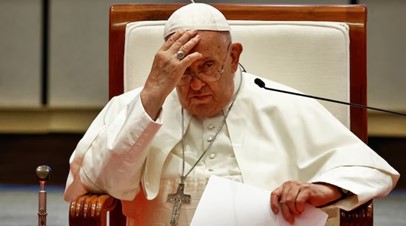
Pope Urges Immediate Action on Climate Change, Citing Human Exploitation of Nature
During his visit to Indonesia, Pope Francis called on both Muslims and Catholics to unite in urging global leaders to tackle the urgent threats posed by climate change and extremism. On Thursday, he addressed a gathering at Jakarta's Istiqlal Mosque, the largest mosque in Southeast Asia, emphasizing the shared values between religious communities and the need for decisive climate action.
In a joint declaration signed with Indonesia's Grand Imam Nasaruddin Umar and other religious leaders, Pope Francis highlighted how human exploitation of the environment has accelerated climate change, resulting in devastating natural disasters, global warming, and unpredictable weather. The declaration urged "decisive action" to protect the integrity of the planet's ecosystems.
"We sincerely call on all people of good will to take meaningful steps to preserve the natural environment and its resources," read the statement, reflecting a strong call for environmental stewardship.
Pope Francis' visit to Indonesia, the world's most populous Muslim-majority country, is part of a broader 12-day tour of Southeast Asia and Oceania. While visiting Jakarta, he also addressed an interfaith audience outside the mosque, where he underscored the importance of unity and shared spiritual roots among different religions.
The pope noted the symbolism of a new underground tunnel, dubbed the "Tunnel of Friendship," that connects the Istiqlal Mosque with the nearby Catholic cathedral. He called the passageway an "eloquent sign" of how people of different faiths can find common ground. "By looking deeply, we discover that we are all brothers and sisters, all pilgrims, on our way to God," the pope said.
Chaturrini Widosari, a Muslim woman attending the interfaith event with her Catholic friend, described the pope as a "role model" for promoting peace and harmony between different religions.
Indonesia, home to 280 million people, is predominantly Muslim, with around 87% of the population adhering to Islam and 3% being Catholic. Pope Francis has consistently emphasized dialogue between Catholics and Muslims throughout his papacy, and this visit builds on his previous efforts, including his historic 2019 trip to the Arabian Peninsula, where he signed a declaration with the Grand Imam of Al-Azhar, a leading authority in Sunni Islam.
Climate change has been a central issue for Pope Francis, who was a driving force behind the 2015 Paris Climate Agreement. His visit to Jakarta is particularly poignant, as the city struggles with severe environmental challenges such as chronic flooding and sinking land, which have been exacerbated by climate change. In response, the Indonesian government is in the process of relocating the capital to Nusantara, on the island of Borneo.
Later in the day, Pope Francis is set to celebrate Mass at Jakarta's Gelora Bung Karno Stadium. As a sign of respect, Indonesia's religious affairs minister suggested that local broadcasters suspend the usual afternoon Muslim call to prayer and instead display it as a text overlay during the Mass.
Following his stay in Indonesia, Pope Francis will continue his journey to Papua New Guinea, East Timor, and Singapore, covering nearly 33,000 kilometers (21,000 miles) before returning to Rome on September 13.